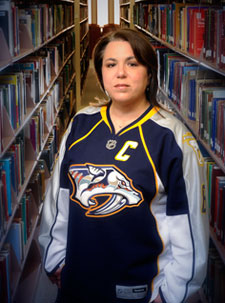 Life can be tough for an ice-hockey fan in sunny, football-focused Alabama. Rebecca Dobrinski, a Chicago native and follower of several teams, relies on cable television to keep up with most games, and she has season tickets to the Nashville Predators, a three-hour drive away. Now she has found another way to follow her favorite sport—by tracking it through time.
Life can be tough for an ice-hockey fan in sunny, football-focused Alabama. Rebecca Dobrinski, a Chicago native and follower of several teams, relies on cable television to keep up with most games, and she has season tickets to the Nashville Predators, a three-hour drive away. Now she has found another way to follow her favorite sport—by tracking it through time.A master's student in the UAB Department of History and Anthropology, Dobrinski has researched the expansion of the sport into the South over the past 70 years. She presented her recent paper on the arrival of hockey in Nashville at the annual conference of the North American Society for Sport History at the end of May.
Flying South
 Minor league teams expanding from cities in the northern United States and Canada brought hockey to the South as early as the 1940s, Dobrinski explains. "The National Hockey League consisted of only six teams from the 1920s to the 1960s, so many players had to rely on the minor leagues if they wanted to continue playing after college/juniors." The new teams faced the challenge of introducing their sport to potential audiences, however. Nashville's Dixie Flyers, debuting in 1962, got help from newspaper reporters, who wrote articles profiling the mostly Canadian players, detailing team practices, and explaining the unique vocabulary of the game. One story even featured a diagram of a rink to indicate the importance of lines and circles on the ice. Hockey practices and coaches often were compared to their football counterparts, and the sports writers made a point of mentioning the possibility of player fights on the ice—an added incentive for some curious ticket-buyers.
Minor league teams expanding from cities in the northern United States and Canada brought hockey to the South as early as the 1940s, Dobrinski explains. "The National Hockey League consisted of only six teams from the 1920s to the 1960s, so many players had to rely on the minor leagues if they wanted to continue playing after college/juniors." The new teams faced the challenge of introducing their sport to potential audiences, however. Nashville's Dixie Flyers, debuting in 1962, got help from newspaper reporters, who wrote articles profiling the mostly Canadian players, detailing team practices, and explaining the unique vocabulary of the game. One story even featured a diagram of a rink to indicate the importance of lines and circles on the ice. Hockey practices and coaches often were compared to their football counterparts, and the sports writers made a point of mentioning the possibility of player fights on the ice—an added incentive for some curious ticket-buyers.Even today, teams in nontraditional markets such as the South must educate the public about hockey, Dobrinski says. "It's difficult for minor league teams to keep a fan base going and revenue coming in. It's also interesting to see how many of the Southern NHL teams adopt some of the strategies that have proven successful in the minor leagues."
Dobrinski says a class writing assignment inspired her to merge urban history with the ice rink. "By nature, much of sports history in the United States is related to urban history, especially modern sports history," she explains. Experts including UAB's Raymond Mohl, Ph.D., distinguished professor of history, have written that sports helped define class boundaries and promote a mass spectator culture in the 19th century. In more recent decades, Dobrinski says, "sports have become an integral part of how our society communicates and initializes socialization. Just look around—football is practically a religion in Alabama. Quite often, one of the first questions someone asks you here is about your team allegiance."
Examining the Fans
Dobrinski's research involved plenty of books, journals, newspaper articles, and Web sites, but mostly, she conducted interviews with Nashville residents. She heard hockey stories and gained important details from longtime fans, retired sports reporters, and former broadcasters who called games on local radio. "I met some great people in Nashville," she says. "Many of them happily told me about their first game or their first contact with the sport."
 Now Dobrinski wants to learn more about the sport's supporters. "Who are hockey fans? That's a big question that inadvertently came out of my research," she says. "Interestingly, there is an intense female fan base that is incredibly knowledgeable about the game, and it's not a modern phenomenon. I plan to do more analysis of the audience."
Now Dobrinski wants to learn more about the sport's supporters. "Who are hockey fans? That's a big question that inadvertently came out of my research," she says. "Interestingly, there is an intense female fan base that is incredibly knowledgeable about the game, and it's not a modern phenomenon. I plan to do more analysis of the audience."Inside View
She will also continue writing about urban history. Dobrinski's master's thesis will focus on the evolution of Birmingham neighborhoods, and she is coauthoring a book on the history of Loveman's department store, a local institution and downtown landmark for decades. "I am especially looking forward to researching the role Loveman's played during the Civil Rights era in Birmingham," she says.
The "speed and finesse" of her favorite sport are tough to resist, however. While conducting research for her paper, Dobrinski discovered The Hockey Writers, a national news blog devoted to the sport. She submitted writing samples and is now a regular contributor, working on reviews of hockey-related books and fan-based team blogs. She plans to volunteer with a new junior-level hockey team coming to Birmingham this summer, which will offer the opportunity to learn "how teams run from an insider's viewpoint," she says.
"Ideally, I would love to be a team or league historian," says Dobrinski. "I will always work on sports history, even while I continue my other pursuits."
—By Charles Buchanan


